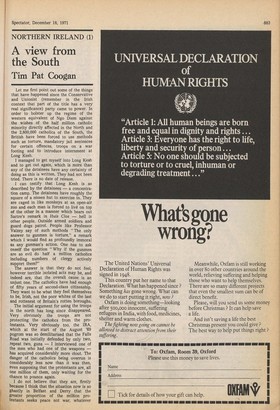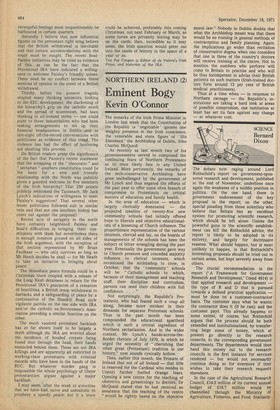NORTHERN IRELAND (1)
A view from the South
Tim Pat Coogan
Let me first point out some of the things that have happened since the Conservative and Unionist (remember in the Irish context that part of the title has a very real significance) party came to power. In order to bolster up the regime of the western equivalent of Ngo Diem against the wishes of the half million catholic minority directly affected in the North and the 2,800,000 catholics of the South, the British have been forced to use methods such as torture, mandatory jail sentences for certain offences, troops on a war footing and to introduce internment at Long Kesh.
I managed to get myself into Long Kesh and to get out again, which is more than any of the detainees have any certainty of doing as this is written. They had not been tried. There is no date of release.
I can testify that Long Kesh is as described by the detainees — a concentration camp. The detainees have roughly the square of a nissen hut to exercise in. They are caged in like monkeys at an open-air zoo and each man is forced to live on top of the other in a manner which bears out Sartre's remark in Huis Clos — hell is other people. Outside armed soldiers and guard dogs patrol. People like Professor Vaizey say of such methods "The only answer to gunmen is torture," a remark which I would find as profoundly immoral as any gunman's action. One has to ask onself the question "Why if the gunmen are so evil do half a million catholics including numbers of clergy actively support them?"
The answer is that they do not feel, however terrible isolated acts may be, and indeed are, that the overall cause is an unjust one. The catholics have had enough of fifty years of second-class citizenship. They want to be what they feel themselves to be, Irish, not the poor whites of the last and rottenest of Britain's rotten boroughs.
The initial argument for using the troops in the north has long since disappeared. Very obviously the troops are not protecting the catholics from the protestants. Very obviously too, the IRA, which at the start of the August '69 pogrom was so demilitarised that the Falls Road was initially defended by only two, repeat two, guns — I interviewed one of the men who had one of the weapons — has acquired considerably more clout. The danger of the catholics being overrun is considerably less now than it was then, even supposing that the protestants are, all one million of them, only waiting for the chance to pounce again.
I do not believe that they are, firstly because I think that the situation now is so ghastly in Belfast and Derry that the greater proportion of the million protestants seeks peace not war, whatever revengeful feelings must unquestionably be harboured in certain quarters.
Secondly I believe that now influential figures on the protestant right wing believe that the British withdrawal is inevitable and that certain accommodations with the south must be sought. The recent BoalPaisley initiatives may be cited as evidence of this, as can be the fact that the Provisional IRA have indicated a willingness to welcome Paisley's friendly noises. There need be no conflict between these sections of opinion in the event of a British withdrawal.
Thirdly, before the present tragedy erupted many thinking unionists, looking to the EEC development, the slackening of the hierarchy's grip on the catholic south and the spread of ecumenism, had been thinking in all-Ireland terms — one could point to those industrialists who had been making arrangements to set up their financial headquarters in Dublin and to late-night off-the-record conversations with politicians as evidence of this trend. The violence has had the effect of hastening not aborting this process.
Do British readers grasp the significance of the fact that Paisley's recent statement that the scrapping of the " theocratic " and "
sectarian" southern constitution could be the basis for a new and friendly relationship with the North was publicly given a guarded welcome by five members of the Irish hierarchy? That 250 priests publicly welcomed the Taoiseach, Mr Jack Lynch's indications of willingness to meet Paisley's suggestion? That several other lesser politicians followed suit in similar vein and that not one southern bishop has come out against the proposal?
Recent acts of savagery in the north have certainly heightened Paisley and Boal's difficulties in bringing their constituents with them but nevertheless there is enough common ground on all sides of the Irish argument, with the exception of that section represented by Mr Brian Faulkner — who only survives as long as Mr Heath decides he shall — for Mr Heath to take an initiative in bringing about peace.
The immediate peace formula could be a Christmas truce coupled with a release of the Long Kesh detainees in return for the Provisional IRA's guarantee of a cessation of hostilities, a British troop withdrawal to barracks and a safeguarding of peace by a continuation of the Shankill Road style vigilante patrols on the one side with IRA and/or the catholic ex-Servicemen's Association providing a similar function on the other.
The much vaunted protestant backlash has so far shown itself to be largely a myth although the IRA are worried about the incidence of hooded corpses being found shot through the head, their hands manacled behind them. These are not IRA killings and are apparently all restricted to working-class protestants with criminal records who have been in the hands of the RUC. But whatever murder gang is responsible the whole psychology of Ulster protestantism argues against a major backlash.
I may seem, after the week of atrocities that we have had, naive and unrealistic to prophesy a speedy peace: but if a truce could be achieved, preferably this coming Christmas, not next February or March, as some tories are privately hinting may be on the cards, then, incredible as it may seem, the Irish question would peter out into the sands of history in the space of a year or so.
Tim. Pat Coogan is Editor of de Valera's Irish Press, and historian of the IRA.











































 Previous page
Previous page